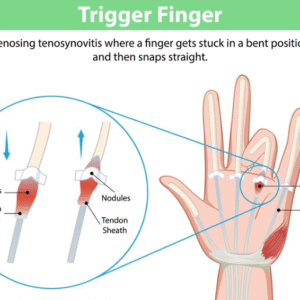Temporomandibular joints or jaw joints connect the mandible (lower jaw bone) to the temporal bones of the skull. Every joint in the body has muscles that help in movement. The muscles connected to the temporomandibular joint help in the movement of the jaw sideways, up and down, forward and back. A Temporomandibular Joint (TMJ) Disorder occurs when simple and regular movements become painful.
Let us look at the symptoms, causes, and treatments for temporomandibular joint (TMJ) disorders.
The Symptoms of TMJ Disorders
- Most people with TMJ disorders experience pain and discomfort while moving the jaw. There is a slight ‘click’ when opening the mouth to speak. Eating and even drinking become quite painful.
- Pain radiating to the cheeks, ears, and neck is quite common with TMJ disorders but not experienced by everyone. Many experience acute pain in the back accompanied by a headache, though once again, it is not always the norm.
- Temperature plays a critical role, where extreme climates can signal a problem. The cold can be a trigger, and it is also a reason symptoms can occur.
- A noticeable symptom of the TMJ disorder is a clicking of the bones while chewing or even a grinding noise. This can get tricky if you want to talk, sing, or whistle.
- It is quite disconcerting when you do not know what can be the problem that later manifests into severe pain resulting in limited jaw movements. A Naperville TMJ specialist will look at the symptoms and provide a workable solution.
- We cannot stipulate without evidence that the TMJ disorder occurs because of noise, but it does exacerbate the medical issue. That being said, a ringing sound, numbness, or buzzing in the ear can signal other illnesses. It does provide a wide-angled lens that something is not quite right.
- The initial diagnosis may be looked at as tinnitus, but when there is pain associated with a TMJ disorder, medical advice is a necessity. Dizziness is also a symptom of the disorder. It could also be a nerve-related problem. Before ascertaining that this is the reason, the expert will look at your history of vertigo or other related illnesses.
- A one-off situation that causes your jaw to break out with pain may not be a reason to worry. Nevertheless, jotting down the reasons as to why it manifested may be a symptom in itself.
- The movement of the jaw can trigger a series of upsets causing extreme discomfort.
The temporomandibular joint is a complex joint that moves both vertically and horizontally, the symptoms, causes, and the TMJ pain treatment in Illinois have to be spot on.
Causes of TMJ Disorders
Research has provided the medical fraternity with some known causes of temporomandibular joint (TMJ) disorders. Let us look at the reasons why this disorder occurs:
- A physical injury to the area causing damage to the jaw or face causes joints to be affected along with the muscles and nerves as well. Sometimes we can subconsciously damage the jaw while brushing our teeth and accidentally bang the face.
- A good number of people subconsciously grind or clench their teeth while sleeping. Some even clench their teeth regularly when they are not sleeping! This is another cause as to why many people end up with acute TMJ disorders.
- Joint pain can affect the Temporomandibular joint; in sum, arthritis cannot be ruled out. Doctors working for TMJ care in Illinois also put it down to arthritis being a cause of the disorder. If this is a cause of the disorder, a long-term treatment plan will have to be worked out by the specialists.
- Unfortunately, opening the mouth can cause the jaw to feel the brunt. A simple cavity, root canal, or implant is not an everyday affair. The constant opening and closing of the mouth can cause a ripple effect. In sum, dental surgery and orthodontic treatments can also be the cause of TMJ disorders.
- Autoimmune thyroid diseases like Grave’s disease and Hashimoto, lupus, and Sjogren’s disorders are some reasons why people with long-term illnesses may fall prey to TMJ disorders.
- Medical procedures that require breathing tubes to be inserted in the mouth before surgery can trigger the disorder.
- Infections also occur, resulting in the tongue getting affected, resulting in headaches, and acute tenderness on the temple.
Visits to the dentist may be a necessity, and half-yearly visits are pretty much a given.
Causes for the disorder to manifest are multiple:
- Singers may experience TMJ disorders quite often. We can put it down to the use of the jaws while singing as they open and close often.
- Genetics also plays a role, as do hormones, environment, and, believe it or not, your occupation. Professionals on the phone for a long duration may also experience TMJ with a host of other problems.
- Violinists may also experience TMJ disorders. They position the violin under the jaw for a long duration. Invariably strain to any part of the body will cause an upset, resulting in pain and medical urgency.
Treatment for TMJ Disorders
The first step to sorting out any problem is to find out what indeed is the problem. Naturally, when there is pain in a joint or muscle, the best advice is to rest the area and limit any excessive movement. Ice the painful area or even warm it and wait it out. A lifestyle change will have to be considered to handle moderate symptoms of TMJ disorders.
Limit Movement
The best possible advice by every TMJ doctor in Naperville is to limit movements of the jaw. Stop chewing gum, and avoid opening the mouth too much. It can get difficult. However, to improve with self-care methods, you must try, or the problem will increase.
Soft Food and Small Bites
Food habits have to change. Eat soft food. What you are looking at is a method that reduces excessive jaw movement, causing stress to the joints and muscles. You will find it quite annoying, but if you do not try limiting the movement of your jaw, it can trigger other upsets. Try you must.
Eat small bites. If you are a burger person, for instance, do not open your mouth wide and dive into that burger. Cut it down to bite-size pieces. That should make it easier on the affected part. Excessive chewing can cause other problems.
No More Grinding
Stop grinding your teeth while sleeping or clenching your jaw. You may not have noticed this regular feature in your daily routine, but now that you do, make an effort. A mouth guard may be suggested by a medical expert to stop you from grinding your teeth while asleep. This should be a lifestyle change that will help you handle a mild or moderate symptom.
Physio to the Rescue
As the days go by, you can massage the area and slightly stretch the jaw. You will know your limits. This will iron out any chinks with the jawbone and limit the problem from being difficult to handle later. Seek physiotherapy if required. Get rest and ease the pain. A combination of ice and heat will help.
Long-Term Treatment for TMJ Disorders
For an ongoing or painful recurrence of TMJ disorders, you may require injections to reduce pain and swelling, if any. Any degenerative conditions that cause an illness to spiral will require a more detailed approach. A specialist for TMJ pain treatment in Illinois can deal with the problem. A steroid injection administered on the joint itself will deal with the pain. This can be a temporary or a permanent solution.
If pain medication, injections, or lifestyle changes do not help, surgery may be the next option. In extreme cases of a TMJ disorder that has caused an injury to the joints, muscles, and other conditions, surgery is the solution. The joint that is damaged will need to be treated by an expert well versed in the condition.
Points To Note
- TMJ disorders are not always lifelong conditions.
- They can occur out of the blue and stop after a couple of days or weeks.
- Some cases can prolong for a longer duration. A treatment and a solution need to be ironed out at the get.
- It is imperative to seek professional advice and treat the problem to resolve such issues. TMJ disorder treatment at Naperville is perhaps the best way to get you to ascertain the extent of damage to your joint and muscle.
- Once the problem is dealt with head-on, the rest will follow.
In Conclusion
Living with chronic pain is never an easy ride. It takes a lot of patience, some changes to your daily routine as well as following advice. Naturally, if there are no underlying reasons as to why you get the pain that you do, it can be annoying. Some people get the disorder, while others do not. If you have been diagnosed with a TMJ disorder, follow the rules set by your TMJ doctor in Naperville to get your system in ship-shaped condition.
A concrete diagnosis and a workable treatment plan should help you deal with TMJ disorders. Aside from these workable ideas, finding a Naperville TMJ specialist who deals with the disorder will be half the battle won.






